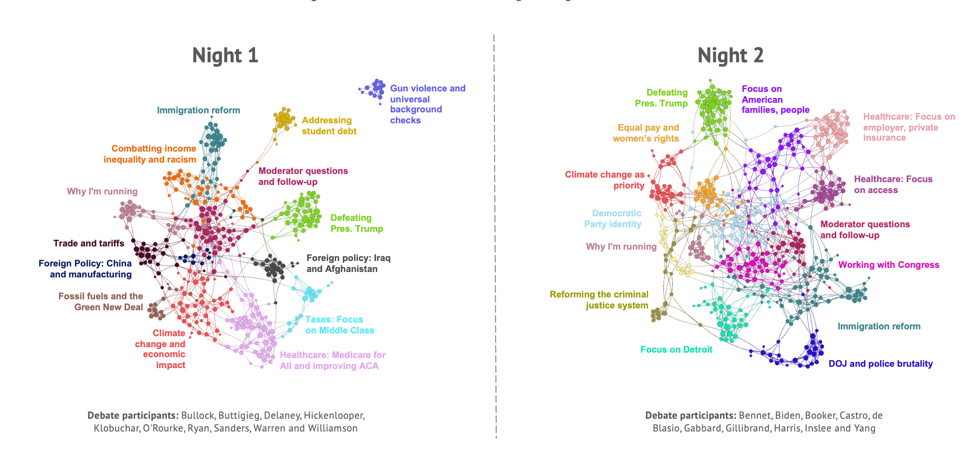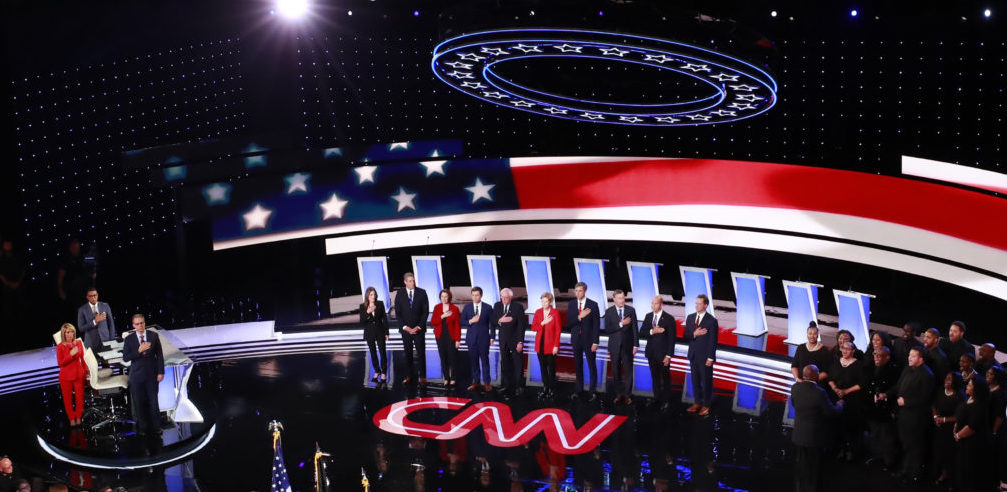20 Democratic presidential candidates traveled to Detroit, Michigan for the second primary debates on July 30 and 31st. While much of the media reporting and online conversation in the aftermath focused on the biggest winners and losers of the night(s), we took a slightly different approach to understand the impact of the debates.
Utilizing Quid, a natural language processing tool, we produced a graphical representation of what was said by each candidate and moderator at the debates in the Motor City. By focusing on what was said by each candidate, we’re able to glean insight into key topics and how they’re connected.

With a wide field, and still 462 days until Election Day, candidates spent a lot of time defining themselves and how they would lead the Democratic Party while on the debate stage.
Although news coverage speculated that the economy would account for a majority of discussion in Detroit, it actually took a backseat to another prominent issue, healthcare. On night one of the debates, which included Montana Gov. Steve Bullock, South Bend, Indiana, Mayor Pete Buttigieg, former Rep. John Delaney (D-MD), former Colorado Gov. John Hickenlooper, former Colorado Gov. John Hickenlooper, former Rep. Beto O’Rourke (D-TX), Rep. Tim Ryan (D-OH), Sen. Bernie Sanders (I-VT), Sen. Elizabeth Warren (D-MA) and activist Marianne Williamson, healthcare was mentioned in over 21% of statements. A driving force of this topic was frontrunner Bernie Sanders’ Medicare for All proposal, which moderators not only asked Sanders himself to defend, but also posed questions to the Vermont senator’s competition about their stance on his signature healthcare proposal.
Another reason behind the prominence of healthcare both nights of the debates at the Fox Theater were critiques of the healthcare industry as a whole. “What I don’t believe is that the profit motive of big pharma or big insurance companies should ever determine, in our great nation, whether somebody gets healthcare or not,” Obama’s former housing secretary Julian Castro said on night two of the debates.
This criticism of industries for their greed was not just specific to the healthcare or Big Pharma, Wall Street, the fossil fuel industry and generic corporations also came under attack by candidates. But these attacks were kept broad and did not zero into specific companies or corporations by name. In fact, less than 1% of overall statements from each night of the debate mentioned a specific company by name.


 What does corporate leadership look like in a divided nation?
What does corporate leadership look like in a divided nation?  Waiting to Engage in D.C. Is the Most Expensive Mistake You’...
Waiting to Engage in D.C. Is the Most Expensive Mistake You’...  The Era of High-Stakes Uncertainty
The Era of High-Stakes Uncertainty  What Forces are Shaping the Future for CMOs?
What Forces are Shaping the Future for CMOs?